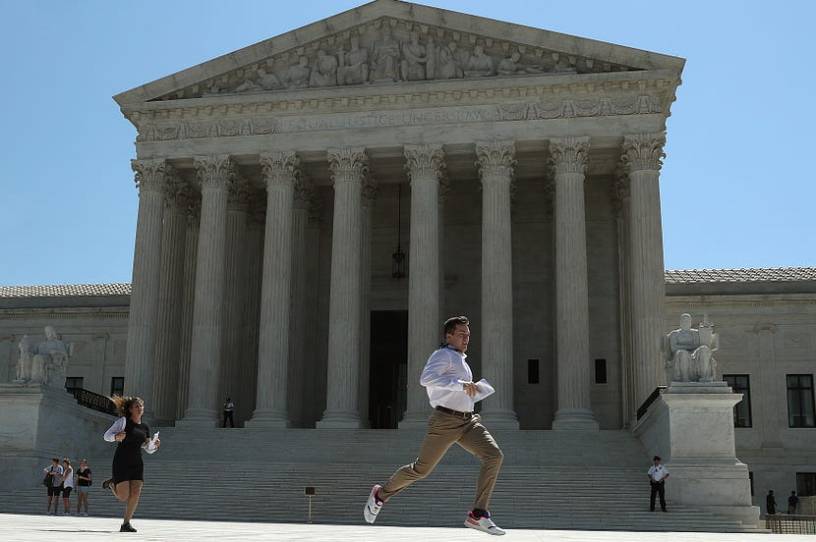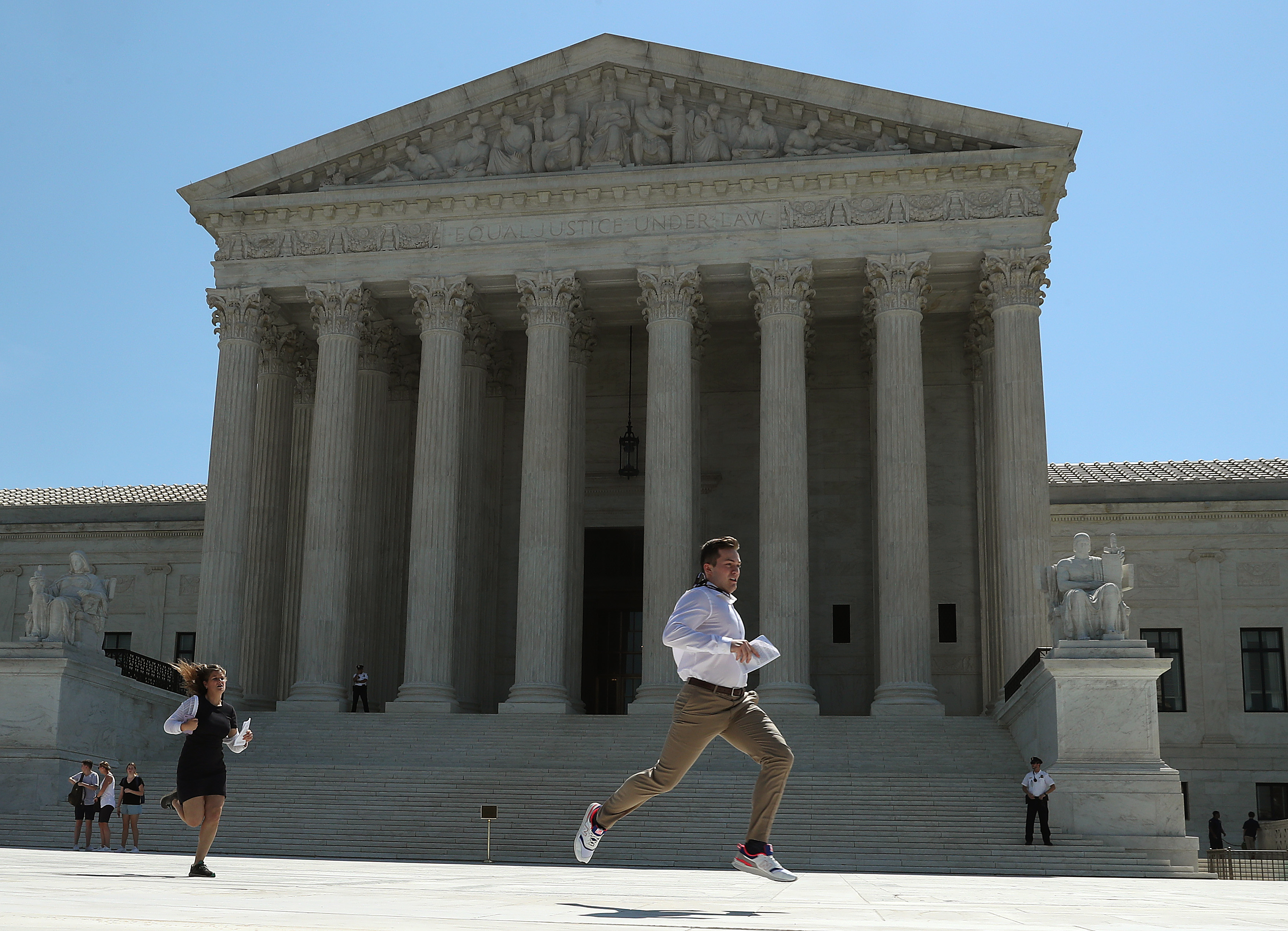The Morning Dispatch: The Upcoming SCOTUS Term Is Going to Be Nuts

Happy Monday! We are on strict orders from the boss to not mention last night’s NFC championship game. So, again, we will not be mentioning that the Packers were losing to the 49ers 27-0 at halftime. You’ll have to check a different morning newsletter for updates on the Packers’ 37-20 loss to the 49ers. Sorry for any inconvenience. (Editor’s Note: The 8-8 Chicago Bears watched the NFC Championship from home. Again. Patrick Mahomes, the NFL MVP quarterback the Bears passed over to select Mitch Trubisky, is headed to Miami for the Super Bowl.)
Quick Hits: What You Need to Know
With President Trump’s impeachment trial set to begin tomorrow, the White House’s legal team is set. In addition to White House counsel Pat Cipollone and Jay Sekulow, constitutional law professor Alan Dershowitz (in a limited role) and former independent counsel Ken Starr will be arguing on behalf of President Trump. Robert Ray, Jane Raskin, Pam Bondi, and Eric Herschmann have joined the team as well.
Secretary of State Mike Pompeo said the State Department will look into allegations of an effort to surveil Marie Yovanovitch, the former U.S. ambassador to Ukraine who was ousted from her post last year. Pompeo said he was unaware of any such surveillance.
Chris Collins, former Republican congressman from New York and an early supporter of Donald Trump, was sentenced to 26 months in jail after pleading guilty to insider trading charges.
After stoking speculation for weeks, the New York Times editorial board (not the newspaper as a whole) endorsed Elizabeth Warren and Amy Klobuchar in the Democratic primary.
TheNational Archives admitted it “made a mistake” by altering an image displayed in the lobby, blurring out messages critical of President Trump.
The Super Bowl is set. The Kansas City Chiefs will face off against the San Francisco 49ers in Miami on February 2.
The Upcoming Jam-Packed Supreme Court Term

Friday proved to be another big day at the Supreme Court. After the justices’ private conference, they added two particularly noteworthy consolidated arguments to be heard this term, adding more fireworks to an already blockbuster group of impending decisions.
First, the so-called “faithless elector” cases from Washington and Colorado, which challenge state laws that punish or remove members of the Electoral College who refuse to vote the way state law requires. For example, Washington state law requires an elector to vote for the presidential and vice presidential candidates who won the popular vote in the state and punishes violators with a $1,000 fine. Colorado, on the other hand, referred one of its faithless electors for prosecution. So the question before the court is whether the fairly specific provisions of the 12th Amendment or federal law allow states this sort of power over its electors.
And why does this matter? The Washington plaintiff argues that there were 10 such electors in 2016, and that of the previous 58 elections, a 10-member swing would “have changed the results in five of fifty-eight prior elections.” So probably best to get the rules sorted out before 2020.
Second, the never ending wars over the ACA’s birth control mandate continue, this time with a nationwide injunction twist to keep things interesting. Since this is the third installment to this movie franchise, we’ll run through a quick refresher. In 2014, the Supreme Court in Hobby Lobby said that a closely held, for-profit companies with sincere religious objections couldn’t be forced to comply with the contraception mandate because it violated the Religious Freedom Restoration Act. In 2016, the court heard objections to the Obama administration’s post-Hobby Lobby regulatory accommodation which created a process by which the exempted employer’s insurance company would be obligated to cover contraception for female employees without the exempted employer directly paying for it, but after the death of Justice Scalia left the court with only eight votes, the case was sent back down to the lower courts without resolution.
That brings us to the Trump administration, which in 2018 issued a final rule that extended the exemption to a broader swath of employers with religious or moral objections and allowed them to simply opt-out of contraception coverage rather than participate in the Obama-era accommodation process that was still being litigated. Pennsylvania and New Jersey sued, arguing that this new rule violated the ACA and the rulemaking process, and the lower courts issued a nationwide injunction against its enforcement.
The court has agreed to hear not only the challenge to the merits of the Trump rule but also to the appropriateness of the nationwide injunction. In best movie preview voice: Contraception Mandate 3: Expanded and Enjoined, coming to a Supreme Court near you in April.
And we’re not done yet. More orders are expected Tuesday and there are still some outstanding petitions worth watching: California’s sanctuary city laws, the Philadelphia foster care system that excluded a Catholic charity that does not certify same sex-married couples, and the Washington florist who refuses to provide custom arrangements for same-sex weddings.
A Tale of Two Generals
In their new book A Very Stable Genius (released tomorrow),* Philip Rucker and Carol Leonnig take readers from Donald Trump’s stunning victory on Election Day 2016 through June 2019— but Donald Trump is not the most interesting character in the story they tell. Or really even a character at all. Instead, he is more like the brightly colored and off-balance setting for a character play about all of the other people who entered the orbit of the administration for the last three years. In that sense, it’s like reading about a reality show in which four-star generals and top notch lawyers are thrust into a season of Lost. President Trump is the island itself, with his own inexplicable rules that are both precarious and impossible to navigate as the cast tries to stave off disaster in each episode.
Nothing demonstrates this better than the account of two former generals who each maneuver through this treacherous landscape as deftly as they can until abruptly ending their service within weeks of each other in December 2018. Chief of Staff John Kelly and Secretary of Defense Jim Mattis both viewed their roles working for the mercurial president as one of duty but executed those roles very differently.
Leonnig and Rucker portray Jim Mattis as a man who knows he’s entering a storm in January 2017 but viewed his role as one of duty to serve a novice commander in chief. He is introduced early in the book asking candidates for senior staff positions in interviews whether they can “‘ride the brand,'” by which Mattis meant could they “support Trump, warts and all.” Time and again, Mattis is there to counsel the president but ultimately follow orders. Until he can’t.
The story of Mattis’s resignation won’t be new to readers who followed the news at the time but in context it is telling. Early in December 2018, Mattis had traveled to Ottawa to meet with allies in the anti-ISIS efforts in Syria. He assured them that “the United States would provide financial and military backing at least into 2020, per a policy vetted by the National Security Council and signed by John Bolton.” But then, in early October 2019, with Mattis long out of the picture, Trump got on the phone with Turkish President Recep Erdogan. According to the book, “one senior administration official summed up the sentiment: ‘Trump was like, ‘You want that pile of dirt, Erdogan? Fine.'” And with that, the U.S. effectively ended its efforts in Syria, abandoning our erstwhile allies, the Kurds, and leaving the country to the malign influence of Iran and Russia.
Receiving an order that “effectively forced Mattis to abandon a fellow warrior on the field,” Mattis did not attempt to delay or curtail the president’s actions. He delivered his resignation letter to Trump the day after the public announcement. It “offered no praise of the president” but stated plainly that “‘because you have the right to have a Secretary of Defense whose views are better aligned with yours on these and other subjects, I believe it is right for me to step down from my position.'”
Kelly, on the other hand, is portrayed as constantly fighting the president’s baser instincts from behind the scenes. As chief of staff, he believed it was his duty to “steer Trump away from dangerous impulses.” The authors walk through Kelly’s day beginning at 4 a.m. to read all of the major media outlets knowing that “the president’s addiction to press accounts of himself was so strong that Kelly’s daily tasks and discussions inevitably would be determined by the news cycle.”
In one small but telling scene, the president calls Kelly onstage at a rally but Kelly ignores him. Trump, we are told in the book, later vented to other aides that his chief of staff did not follow his command. It wouldn’t be the last time. Throughout the book, Kelly is described “managing” the president, blocking calls and restricting access without the president’s knowledge. Trump believed Kelly was “acting morally superior” and started referring to him as “‘the church lady’ behind his back.”
In the end, Kelly wouldn’t last either, of course. Trump complained that Kelly “sometimes acted as if he had been elected president” and began to instruct aides to keep Kelly out of decisions. A few weeks before the withdrawal from Syria would force Mattis’s hand, the president stopped on the south lawn to tell reporters “‘John Kelly will be leaving. I don’t know if I can say ‘retiring.’ But he’s a great guy.'”
Neither general’s “Trump strategy” proved successful, but perhaps that is the point. As anyone who has worked for a politician can attest, no staffer will agree with his boss’s decisions at every turn but it also cannot be his job to work against an elected boss for the amorphous greater good. The only options: Speak up if you can and resign if you must.
But it will now be up to Mattis and Kelly to determine what, if anything, Americans need to know about their service before 2020. Do they owe a duty of silence as political appointees who agreed to serve a flawed commander in chief until he leaves office? Or do they owe a duty to voters who could benefit from their experience?
Perhaps A Very Stable Genius, based on what the authors describe as hundreds of hours of interviews with more than 200 sources, is one way of doing both.
*Disclosure: This book mentions Sarah Isgur, current staff writer at The Dispatch and former director of public affairs at the Department of Justice (February 2017-November 2018), at multiple points for her role as a senior adviser to both Attorney General Jeff Sessions and Deputy Attorney General Rod Rosenstein during the Mueller investigation.
Worth Your Time
Over the last couple years, the Oregonian has done some great investigative work into a thorny diplomatic problem: Saudi Arabia’s apparent bad habit of spiriting Saudi students who are charged with serious crimes while studying in America out of the country to prevent them from facing justice here. On Friday, the Oregonian released a new report: Government documents show that federal law enforcement is aware of the problem and believes it is done to help save the Saudis legal embarrassment. If you haven’t read the original series before, now’s a great time to do so; or you can read the latest news on the issue here.
Hey, remember Joe Walsh and Bill Weld? The anti-Trump twosome were momentary media celebrities last year when they each announced they would challenge President Trump in the Republican 2020 primary. But while both are still technically running, the prognosis is grim, as Alex Isenstadt points out in Politico: Neither candidate will even come close to making the ballot in all 50 states, to say nothing of making a fundraising splash or eating into Trump’s sky-high poll numbers among Republicans.
On this day celebrating the life and legacy of Martin Luther King, Jr., we recommend you take a few moments to read his Letter from a Birmingham Jail. Written in April 1963 as a response to eight white clergymen arguing against public civil rights demonstrations, King’s words continue to ring true today:
“Oppressed people cannot remain oppressed forever. The yearning for freedom eventually manifests itself, and that is what has happened to the American Negro. Something within has reminded him of his birthright of freedom, and something without has reminded him that it can be gained. Consciously or unconsciously, he has been caught up by the Zeitgeist, and with his black brothers of Africa and his brown and yellow brothers of Asia, South America and the Caribbean, the United States Negro is moving with a sense of great urgency toward the promised land of racial justice. If one recognizes this vital urge that has engulfed the Negro community, one should readily understand why public demonstrations are taking place. The Negro has many pent up resentments and latent frustrations, and he must release them. So let him march; let him make prayer pilgrimages to the city hall; let him go on freedom rides -and try to understand why he must do so. If his repressed emotions are not released in nonviolent ways, they will seek expression through violence; this is not a threat but a fact of history. So I have not said to my people: ‘Get rid of your discontent.’ Rather, I have tried to say that this normal and healthy discontent can be channeled into the creative outlet of nonviolent direct action. And now this approach is being termed extremist. But though I was initially disappointed at being categorized as an extremist, as I continued to think about the matter I gradually gained a measure of satisfaction from the label. Was not Jesus an extremist for love: ‘Love your enemies, bless them that curse you, do good to them that hate you, and pray for them which despitefully use you, and persecute you.’ Was not Amos an extremist for justice: ‘Let justice roll down like waters and righteousness like an ever flowing stream.’ Was not Paul an extremist for the Christian gospel: ‘I bear in my body the marks of the Lord Jesus.’ Was not Martin Luther an extremist: ‘Here I stand; I cannot do otherwise, so help me God.’ And John Bunyan: ‘I will stay in jail to the end of my days before I make a butchery of my conscience.’ And Abraham Lincoln: ‘This nation cannot survive half slave and half free.’ And Thomas Jefferson: ‘We hold these truths to be self evident, that all men are created equal . . .’ So the question is not whether we will be extremists, but what kind of extremists we will be. Will we be extremists for hate or for love? Will we be extremists for the preservation of injustice or for the extension of justice? In that dramatic scene on Calvary’s hill three men were crucified. We must never forget that all three were crucified for the same crime–the crime of extremism. Two were extremists for immorality, and thus fell below their environment. The other, Jesus Christ, was an extremist for love, truth and goodness, and thereby rose above his environment. Perhaps the South, the nation and the world are in dire need of creative extremists.”
Here’s the thing. It isn’t as though we like feeding you, our readers, a constant supply of dystopian privacy/tech news—that’s just a place where a bunch of eye-popping stuff seems to be happening these days! The latest grisly feature comes courtesy of Kashmir Hill at the New York Times. We’d summarize, but honestly, just read the lede:
Until recently, Hoan Ton-That’s greatest hits included an obscure iPhone game and an app that let people put Donald Trump’s distinctive yellow hair on their own photos.
Then Mr. Ton-That—an Australian techie and onetime model—did something momentous: He invented a tool that could end your ability to walk down the street anonymously, and provided it to hundreds of law enforcement agencies, ranging from local cops in Florida to the F.B.I. and the Department of Homeland Security.
Presented Without Comment
Also Presented Without Comment
Something Fun
Kids are amazing. Six-year-old Owen Colley has raised more than $240,000 selling homemade clay koalas to help combat the bushfires sweeping Australia.
“I want them to know more about Australia and I want them to know more about what animals are in Australia,” Owen said.

Toeing the Company Line
New York Times columnist David Brooks dropped by Dispatch HQ last week to record an episode of The Remnant. He and Jonah talked about tribalism, nationalism, and the word “conservative.” Be sure to give it a listen here!
Jonah also pumped out a G-File on Friday taking Elizabeth Warren to task for her series of untruths. “Warren’s a remarkable liar, but she’s not a very good one.”
David is out with another excellent edition of his Sunday French Press, this one delving into the scourge of anti-Semitism. “the unpleasant truth is that when populations of new and different people (especially religious or racial minorities) move to new and different towns, they all too often encounter vicious bigots. They don’t create vicious bigots.”
New to the website: Sarah details all the ways Citizens United changed our politics the last 10 years (and, more important, all the ways it didn’t). And Jerry Kratochvil demonstrates how Kansas Republicans face a choice in the Senate primary between Kris Kobach and Rep. Roger Marshall that in many ways mirrors the Democratic primary’s battle between ideological purity and electability.
Let Us Know
This brief clip of presidential candidate Andrew Yang joining a church choir for a few songs began making the rounds yesterday.
Our question to you, dear reader: Who is the most likable politician of your lifetime?
Reporting by Declan Garvey (@declanpgarvey), Andrew Egger (@EggerDC), Sarah Isgur (@whignewtons), and Steve Hayes (@stephenfhayes).